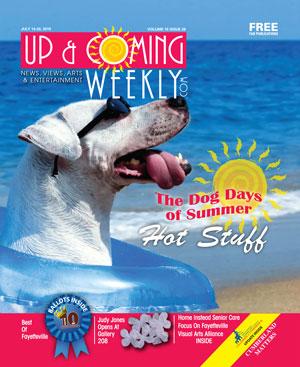 With record-breaking scorching temperatures, thick humidity and heat indexes over 100 degrees, many are staying inside to avoid the hot weather. But for those who want to get out and enjoy the summer, what’s the best way to stay safe?
With record-breaking scorching temperatures, thick humidity and heat indexes over 100 degrees, many are staying inside to avoid the hot weather. But for those who want to get out and enjoy the summer, what’s the best way to stay safe?
Drink It In
It is often hard to tell just by looking at someone whether or not they are dehydrated. People may not know what signs to look for in others or themselves if they are dehydrated.
Some of the first signs of dehydration are heat cramps in the legs or abdomen, due to a drop in electrolytes after long exposure to the sun, sweating, and feeling tired or excessively hot. How much water people drink after going to the bathroom can also affect hydration. When people sweat or use the bathroom, fluids are essentially leaving the body. If people do not re-hydrate with water, they may feel cool, moist to the touch, pale or dizzy and could potentially pass out.
In severe cases, a heat or sun stroke may occur. If someone has hot, red skin that feels dry or moist, are vomiting or have a high body temperature they are at risk for a heat stroke. Immediately call 911 then apply ice packs, wrapped in a cloth or other material, to the person’s armpits, groin, wrists, neck and ankles to help cool them.
In order to avoid dehydration it is best to never be outside between 11 am and 2
p.m., when the temperature is the hottest, don’t eat heavy meals, be aware of the heat
index and humidity, wear light weight and loose clothing, take frequent breaks when
doing yard work or working outside, avoid alcohol, soft drinks and other 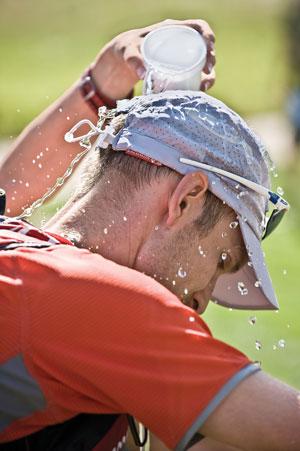 drinks with
caffeine and drink plenty of water.
drinks with
caffeine and drink plenty of water.
“There is a disagreement on drinking eight glasses of water a day,” said Mary Lou Powers of the Highland’s Chapter of the American Red Cross. “Eight glasses should be a minimum because everyone knows their own body.”
Powers also pointed out the importance of never leaving children sitting inside cars, regardless of the time of year, and checking on people who live alone and especially on those who live without air conditioning.
“A lot of people who don’t have a cool place will go somewhere with air conditioning like a mall or library,” said Powers.
The easiest way to stay safe and hydrated is to always use the “buddy system.” Having a buddy with you while playing or working outside will help keep you hydrated by checking up on one another and will help prevent the negative effects of dehydration.
Powers further suggested that people should wear hats when they are outside and
should wear sunscreen, reapplying it every 45 minutes even if the label says it is waterproof.
She stressed that it is very important to read the labels on sunscreens and to be
very careful with babies outside because their skin is very sensitive to sunlight.
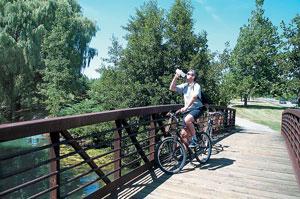
With pet friends we want to remember to provide clean water for them at all times and give them breaks every 10 to 15 minutes to drink water when playing with them. Try not to play with them during the hottest hours of the day. For cool refreshments to keep pets well-hydrated, freeze water with flavored biscuits or treats inside, or freeze a little vegetable broth inside their water. For further information, call your local veterinarian.
Heat It Up
Summer is here and people are pulling out their grills for picnics, cookouts
and outdoor fun. When preparing for a grill-out, one of the most important things
to remember is grilling safety. Roger Sullivan, Captain and Public Educator for the
Fayetteville Fire and
Emergency Management
department offered these
safety tips:
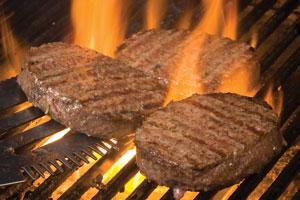
• For first time use on a cast iron grate or griddle, wash it thoroughly with a mild dishwashing liquid to remove the protective wax coating that is applied to the grill for shipping. Rinse with hot water and dry completely with a soft cloth or paper towel. Do not allow the griddle to drain dry and do not wash in a dishwasher. Then season the grates or griddle, to prevent rusting and sticking, by spreading a thin coat of solid vegetable shortening over the entire surface of the grill with a paper towel. Do not use butter or margarine for seasoning.
• Remember propane and charcoal grills should only be used outside, a good distance away from the home itself, deck railings, out from under roof overhangs and tree branches.
• Indoor use of propane or charcoal grills may result in death by fire or CO poisoning.
• Always keep children and pets away from the grilling area. -Set up a three foot “kid-free zone” around the grilling area in order to prevent accidents. -Keep grills away from any lawn games, play areas or foot traffic.
• Grill chefs should use long handled grilling tools in order to ensure safety from heat and flames.
• Never leave your grill unattended.
• Keep your grill clean by removing grease and fat build-up on the grill itself and trays underneath.
• Consult your grill manual for proper detergents and devices to clean the grill after its first use.
Charcoal Grills
For charcoal grills, a charcoal chimney starter will allow a grill to be started using newspaper as a fuel. A chimney starter is a metal cylinder with a charcoal grate mounted inside. The unlit charcoal is placed in the top of the cylinder then the newspaper is placed into the bottom underneath the grate and when lit, it burns and lights the charcoal. Chimney starters can be purchased at most hardware stores.
Only use charcoal starter fluid on charcoal grills and do not add any starter fluid or other flammable liquids to the grill fire once it has started. Remember to always keep charcoal starter fluid out of children’s reach and away from all other sources of heat.
Electric charcoal starters can also be used as an alternative to starter fluid, matches or gas lighters. An electric charcoal starter is a simple device with a handle on one end and a loop of metal on the other, which serves as the heating element.
When finished grilling, coals should be completely cool before they are disposed of in a metal container.
Propane Grills
Before using a propane tank each year the gas tank hose should be checked for leaks by adding a light soap and water mix to the hose. A propane leak will release bubbles. If the grill has a propane gas leak, determined by the smell or soapy bubble test, turn off the gas tank and grill if there is no flame. If the leak stops, get the grill serviced by a professional before using it again. If the leak does not stop call the fire department immediately. If you smell gas while grilling, get away from the grill immediately and call the fire department, but do not attempt to move the grill. Always remember to never store propane gas tanks in buildings or garages and if storing a gas grill inside during the winter, disconnect the cylinder and leave it outside.
Always use only equipment with a recognized testing laboratory on it and follow manufacturer’s instructions on how to set up a grill and maintain it.
In a three year period, U.S. fire departments responded to 7,900 home fires involving grills. Leaks or breaks is the leading contributor to gas grill fires.
Get Wet, But Not Wild
by DR. SHANESSA FENNER
Summer is here and it is time to relax and have
some fun. Following these safety tips for swimming and
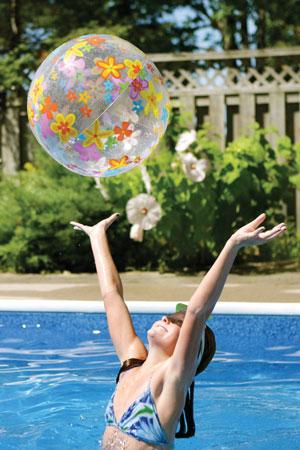 boating activities can ensure that a fun time is also a
safe time.
boating activities can ensure that a fun time is also a
safe time.
Tips for safe swimming
• Don’t run around the pool.
• Learn how to swim. • Swim at a depth that is safe for you.
• Don’t dive into unknown waters. Enter the water feet first.
• Make sure the water is clean from leaves, dirt, and other debris.
• Stay away from drains and filters. Hair or clothing can become tangled in these structures that could trap you under the water.
• Keep TVs and radios a safe distance from the water.
• Drink plenty of water to avoid heatstroke and dehydration.
• Keep an eye on your kids at all times.
• Swim near a lifeguard.
• Take frequent breaks.
• Never swim alone
• Learn to perform CPR (cardio-pulmonary resuscitation).
• Use plenty of sunscreen. Tips for safe boating
• Do not drink alcohol while boating.
• Wear a PFD (personal flotation device) at all times. It keeps you floating if you are too tired to swim or hit your head and lose consciousness.
• Tell someone where you are going and when you will return.
• Do not allow passengers to ride on gunwales, seat backs, or outside of protective railings.
• Bring a weather radio to update you on the weather.
• Keep emergency supplies on board such as floating devices, maps, flares, a fire extinguisher, and a first aid kit.
• Test the boat lights and anchor before you leave the dock.
• Operate the boat at a safe speed.
• Have a designated lookout for swimmers, other boaters, and objects.
• Make sure you have enough fuel and oil for the entire trip.
Pants All Around
by ERINN CRIDER
Summer should be a time fun in the sun and lazy pool days with your fuzzy friend. Most people are well aware of the dangers of heat for the elderly and infirm, but it is also a serious threat for animals and needs to be taken seriously.
Heat stroke is a serious problem when it comes to pets. Pet experts from the Today
Show say that the basic rule of thumb is if it’s too hot for you it’s too hot for your pet,
especially since they have a less efficient cooling system. It is also more dangerous for
dogs with short muzzles, elderly pooches, those with dark hair or a tendency to over exert
themselves. Also, it can help to adjust your pets exercise regimen. For example move play
time to the morning or evening after the weather cools off, and don’t be afraid to cut walks
short if it is hot.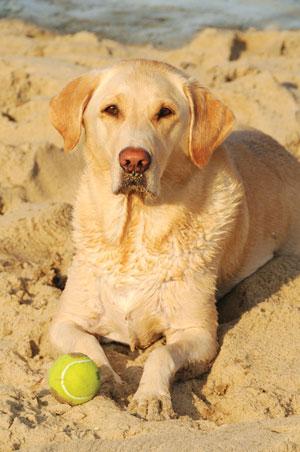
Knowledge is power, so knowing the signs of heatstroke can help you save your best furry friend. Danger signs include: excessive panting, rapid breathing, excessive drooling, dark or bright red gums or tongue, staggering, temperature above 104, bloody diarrhea or vomiting.
If you suspect that your animal is suffering from heatstroke immediately call your vet. To help cool your puppy down you can offer it ice cubes to lick, apply rubbing alcohol to its paws or give it Pedialyte to restore electrolytes. Water should be cool but not cold, to avoid shock.
“A lot of people try to cool the pet too much at home, but sometimes you get into a hypothermia situation. Douse it with cool water, have a fan blowing on the dog, but don’t immerse it in an ice bath. Get it to an animal hospital fast. A dog’s normal temperature is 102º — heat stroke is around 106º and up. But when their temp gets back down to 103, stop cooling them so you don’t risk rebound hypothermia,” explains local veterinarian Dr. Lisa Jonas of Cape Fear Animal Hospital.
Heatstroke can really mess up your summer, but there are definitely some other dangers to look out for during the warmer months, such as the sun. Many people think that because of their fur pets are not susceptible to sunburn, but that is completely untrue. Your pet is even more prone to sunburn if it has light hair or pink skin. You should consult your vet about what kind of sunscreen is good for your pet.
“Many people get their long-haired dogs clipped in the summer, which really isn’t necessary unless it’s a heavily matted coat. Their natural hair cover helps keep them cool and protects them from sun damage,” said Jonas.
Water safety is also something of which to be aware. A pet should never be left unsupervised in a pool because it can drown if it can’t figure out how to get out of the pool and becomes too exhausted. It’s a good idea to teach your pet the way out of the pool or consider using a pet ramp or pet life vest.
Many people go to the beach in the summer and may bring along their pets. It’s important to remember that not all dogs are great swimmers, and even if they are, they can be caught by the undertow or rip current. If the sand is too hot for your feet it’s also too hot for your pet’s delicate paws. (That goes for asphalt, too.) The best vacation for your dog may be to leave them at home.
“They do not enjoy being on the hot beach while you suntan. If they get in the water and drink the salt water, then they are going to have diarrhea,” adds Jonas. And that won’t be fun for either of you.
Finally some tips to keep your buddy cool during the hot summer days: make sure that your pet has access to fresh water at all times, adjust workout routines to the cooler part of the day, and if your pet is outside make sure it has shade and maybe even a kiddy pool to cool off in, and do not leave your pet in the car even with the windows down even “for just a second” it’s just not safe.
“There is no safe time frame, or amount of open windows — it’s an absolute rule — don’t leave them in the car. And if pets have to be outside, make sure they have shade and fresh water,” says Jonas. And remember, these tips are for cats, too!
Also be sure to protect your pets from heartworms (transmitted by mosquitoes) with a monthly preventative medication. Stay safe, and keep your best fuzzy friend safe this summer too.

 How to resolve AdBlock issue?
How to resolve AdBlock issue? 








